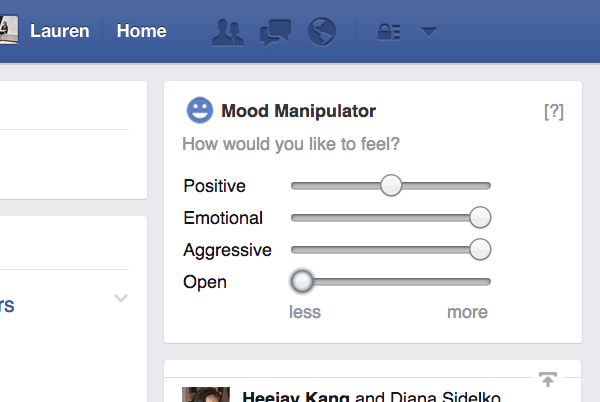
The uproar following the news that Facebook had manipulated the emotions of some of its users by curating the posts they saw in their newsfeed according to specific emotions was understandable. We like to believe that our social networks are indifferent platforms that don’t play with our feelings the way our friends can. In reality, Facebook strictly controls every factor of its website’s experience—it’s far from impartial.
So why not take control into our own hands? Artist Lauren McCarthy’s Facebook Mood Manipulator gives you access to the same technology that the study used to control its subjects emotions. A sliding scale on the website allows users to select what kinds of posts they want, with factors including positive, emotional, aggressive, and open. Turn the positive slide all the way up, and all that appears are happy posts. Turn it down, and negativity replaces all the good vibes.
McCarthy’s app suggests a kind of self-censoring. If you’re feeling down, then maybe you don’t want to see anything sad in your feed. Sure, the app performs a neat trick by scanning posts for emotive keywords and filtering them based on that vocabulary, but it also has a deeper meaning. It shows just how much our lives are contingent on what we experience online—we’re not communicating on social networks so much as living through them.
More Must-Reads from TIME
- Donald Trump Is TIME's 2024 Person of the Year
- Why We Chose Trump as Person of the Year
- Is Intermittent Fasting Good or Bad for You?
- The 100 Must-Read Books of 2024
- The 20 Best Christmas TV Episodes
- Column: If Optimism Feels Ridiculous Now, Try Hope
- The Future of Climate Action Is Trade Policy
- Merle Bombardieri Is Helping People Make the Baby Decision
Contact us at letters@time.com